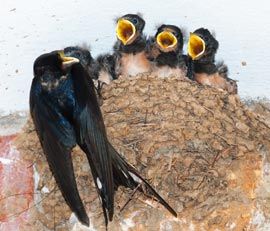Bird Control Services
Bird Removal
Why Choose Griffin
- Safely deter and repel birds using effective abatement and exclusion strategies
- Eliminate health and safety issues that stem from transmissible bird diseases and parasites
- Maintain a bird free environment with ongoing maintenance and monitoring
Immediate Bird Control
Bird Control Service Options
Griffin’s bird control strategies utilize an integrated pest management approach that utilize other methods of control outside of extermination. Effective and non-deadly bird pest control programs include several treatment strategies that offer long term solutions.
Inspection
The first step in addressing bird populations is determining what species of birds is causing the problem and where they are nesting. This will help identify the best strategy for removal. This can sometimes be difficult if the birds are not active or around during the time of the inspection. Any information or pictures that can be provided about the birds regarding their appearance or behavior could give the bird control technician some clues as to the type of bird that needs to be removed. If possible, pictures of the birds actively nesting, perching, or flying will make identification much easier which will expedite the treatment process.
Exclusion
Exclusion is designed to prevent or limit access to areas that would be otherwise used to house a bird’s nest. This control strategy does not cause harm to the birds directly, it just blocks birds from entering your home and forces them to move elsewhere. Exclusion can be implemented using screens, bird netting, or wooden planks to block small opening and entry points.
Perch Modification Systems
In addition to exclusion, which prevents birds from accessing your home, perch modification systems also help mitigate bird activity on or around your property. Using different bird deterrents, like hot wires, exterior perimeter bird spikes, and bird coils help reduce surface areas that birds can land on.
Behavior Alteration Deterrents
These methods utilize harsh noises, lights, and smells to repel birds from a particular area. These are designed to disrupt nesting activity.
Food Source Elimination
Reducing available food supplies can help mitigate the bird populations around your home. That being said, bird populations are likely thriving off of food sources outside of your control, so this strategy only makes sense as a supplement to our other treatment options.
Maintenance
Once exclusion methods have been implemented, on going bird control will be part of the general pest control maintenance schedule if recurring services are enlisted. Our technicians will monitor for signs of new nests and droppings so we can remove any traces of birds before they move in.
Types of Birds
Griffin Pest Management has experience managing the most common nuisance birds found in Southern California:
- Pigeons
- Crows
- Starlings
- Sparrows
- Seagulls

Reasons to Enlist Bird Control Services
While birds are rarely a direct threat to humans, they can cause several problems that can lead to health issues and property damage.
- Most birds are capable of hosting parasites like fleas and bird mites. Bird fleas and mites will shed and infest their nest before moving onto infesting your home.
- Crows, seagulls, and pigeons are all scavengers that will create a mess out of trash and even go as far as destroying property in search of food.
Bird droppings present several problems:
- Pigeon droppings dry out and become a dust that can get picked up and dispersed by HVAC systems. Breathing the contaminated air can be especially dangerous for those dealing with respiratory problems and allergies.
- They are acidic which can cause corrosion and stain different building materials.
- They contain several transmittable diseases and viruses.
- They are unsightly and cleanup can get expensive if left uncontrolled for too long.
Diseases Carried by Birds
Birds are vector of disease and can host a plethora of various bacteria and viruses. The danger in that is bird illnesses can sometimes be picked up by humans which can develop into serious illnesses. A few of the more dangerous illnesses that birds can transmit are:
- Salmonella: This is generally found in pigeon and seagull droppings and can lead to paratyphoid fever and salmonellosis.
- E. Coli: This is generally spread by seagulls but can also cause some serious illness like septicemia and gastroenteritis.
- Psittacosis: This can cause a lung infection transmitted by breathing in bacteria from dried pigeon or seagull fecal matter.
- Fungal Infection: Seagull droppings can contain fungal infections that lead to histoplasmosis and cryptococcosis.
Contact a Bird Control Specialist Today
Nuisance birds rarely go away on their own without the right prevention and control strategy. These birds can cause serious problems and introduce health issues that can be easily mitigated with the right help. Call Griffin Pest Management today to get a licensed bird control and removal expert out to help implement exclusion and deterrent strategies to keep your home free of unwanted birds.
Quick Facts About Nuisance Birds
Habits
Many species of birds are known to actually help the local environment. Smaller birds like finches, doves and woodpeckers, help disperse seeds and keep local insect populations low. Larger birds of prey, like owls and hawks, can help control local rodent populations.
Habitat
Most nuisance birds take up residence in the eaves or trees surrounding a structure. Larger birds prefer to build their nests in tree tops, while smaller breeds prefer lower, enclosed branches of trees or window sills. Some smaller birds also prefer shrubs.
Threats
Larger birds of prey have been known to carry small dogs or cats away. Smaller birds, like finches, pigeons and doves can also spread disease, fleas and bed bugs. A nest of birds can also create an unsightly mess with their fecal matter. Many small birds will also “swoop” on people or animals who are too close to their nest. If those birds have built their nest in the eaves of your home, they may prevent you from going outdoors.
Prevention
Your wildlife specialist will help you identify areas that may attract birds and place bird deterrent devices.

